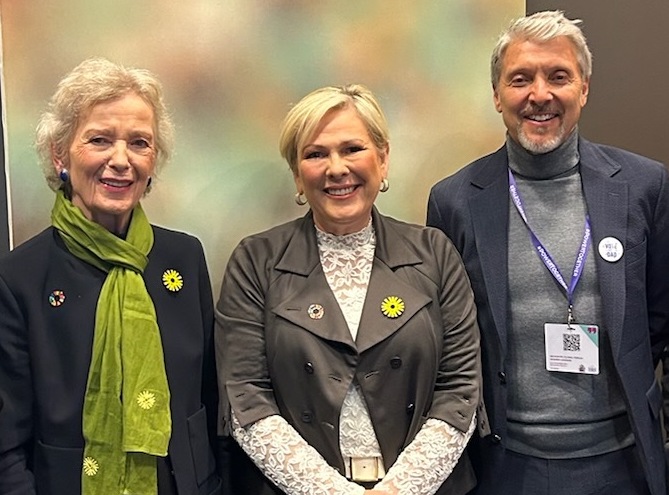Hello Madame President.
Millions of us hoped to finally be able to say that after the US presidential elections. Not only was she a far more competent candidate, who had a policy platform that promised (and would have) brought more good to more of us. She was also not a convicted felon, had never tried to overturn election results, and had prosecuted sex offenders rather than being one. What happened? How did we get here?
A week after the elections, I had the immense privilege of meeting with two Madame Presidents – one being Halla Tómasdóttir, currently the President of Iceland, and the other Mary Robinson, former President of Ireland (and Ireland’s first female president). We all agreed that what happened in the US was more nuanced than the US not being ready for a woman of color as president.

Indeed, all of us agreed that something deeper about American manhood (and men in many countries) is at play.
Trends in American manhood
Equimundo has long sought to understand these trends. Just one year before the election we carried out a national survey of men in the US. Two key findings stood out: One was the tremendous loneliness and social isolation of the youngest men. Gen Z men feel historically unmoored, alone, and lost. As Trump’s campaign staff know well, it’s a short distance and a few provocative battle cries to move men from confusion and isolation to anger.
The other finding that stood out was men’s sense of economic precarity – the feeling that the world has passed them by and in their anguish they want to blame someone. In our nationally representative sample, the more men (of all ages) felt that their economic futures are uncertain, the more they gravitated to the misogynist version of manhood Trump extolls. And the more they blame someone — meaning women, migrants, or LGBT+ individuals – for their problems.
Here’s the simple truth of getting American men to vote for progressive politics and progressive leaders: it’s nearly impossible to sell equality, and social justice to those who feel their futures are uncertain and bleak. Particularly if those men feel they are owed everything. In short, it’s an uphill battle to sell equality, hope, and women’s rights to men who believe in the pernicious myths of American manhood.
In the 1960s sociologist Erving Goffman wrote that a sense of precarity is baked into American manhood. Even at the height of Boomer affluence (at least for white men), he said, it was too easy for men in the US to feel “unworthy, incomplete, and inferior.” Susan Faludi wrote in 1999 that American men feel they have “lost their compass in the world,” and that compared with their fathers’ generation, they feel “less triumphal, less powerful, less confident of making a living.” In the 2010s, Michael Kimmel warned of men’s “aggrieved entitlement” in the face of perceived and real economic precarity.
Jump forward to 2024 and we have the American manhood myth on Manosphere-fueled steroids – still unattainable, still unreachable, still idealized, and now really pissed off. Indeed, the vast majority of men in the US feel they are owed a version of American upper-middle-class manhood that says everything is yours. That new and fast car, that job that will bring a six- or seven-figure salary from day one, that spot at university, that woman (because it is a heterosexual version of hyper-manhood).
How progressives can respond
The Democratic Party has been confused about men – particularly working class men. We mostly ask men to acknowledge their historical privilege and the conversation often ends there. We have good reasons for affirming the needs of socially excluded and historically marginalized groups in the US. We are not done – far from it – when it comes to achieving the equality and justice for all that our country was founded on. But we saw the results of our lack of attention to men’s economic precarity. As Bernie Sanders recently posted, “the Democratic party has abandoned the working class and the working class has abandoned them.”
We need social justice and we need racial and other reparations and much more. But saying we don’t see you or that your struggles don’t matter because you represent a category of humans who have privilege also doesn’t work.
For men, the way to visibility and status – namely a well-paying job, and a university education – is in downward decline. Our most prestigious workplaces and universities love to report how many applicants they turn away. On the left, we quickly point out that the workplace and universities were never fair to women and that we still haven’t achieved wage and work equality. We’re right to point that out.
But many men don’t compare themselves to women. They compare themselves to an idealized winner-gets-all manhood embodied in Trump, Joe Rogan, and Elon Musk. And Trump, Rogan, and Musk know that. They know at a primal level how to speak to lost men. They know that, even as billionaires and multi-millionaires are men nothing like most of us, they are emulated. Trump speaks to the insatiable desire and unattainable version of American manhood. He and his campaign team see into the souls of men and know that those souls are angry, fragile, and eternally precarious.
“Here’s the simple truth of getting American men to vote for progressive politics and progressive leaders: it’s nearly impossible to sell equality, and social justice to those who feel their futures are uncertain and bleak. Particularly if those men feel they are owed everything. In short, it’s an uphill battle to sell equality, hope, and women’s rights to men who believe in the pernicious myths of American manhood.”
Because the shallow core of the myth of American manhood is that no matter how much men strive, they will never have all the things, that job, the money, the sex, and rest that they are convinced they want and think they deserve.
What’s the way forward? Perhaps it’s a new New Deal that sees men in their loneliness and economic precariousness – that offers benefits and opportunities for all, with explicit nods and attention to men while we continue to work to advance and support women’s rights. Perhaps it’s a Democratic Party that focuses on working class men and women in shamelessly populist ways, as Sanders argues. Perhaps it’s learning to speak to the fears of men in compassionate ways. Perhaps it’s listening to men’s confusion so we can walk them to a path of shared social justice.
Maybe we on the left need to extol even more than we did this time around, the virtues of a new American manhood, one that puts us over me, that puts the whole over the one. Maybe we simply need to talk about the myth of American manhood, to see how it is distorting our better selves. And we need to have these conversations with deep care for all of us who are harmed by this myth – women, girls, boys, men, and non-binary persons.
Maybe then, in the US, we will at last get to say. Madame President.




